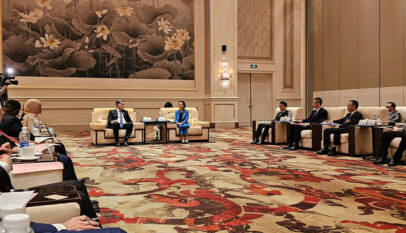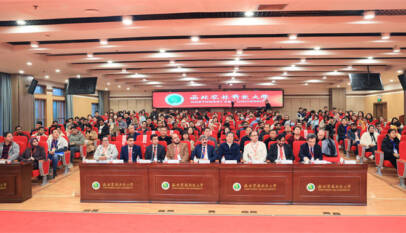Experts highlight importance of Climate-Smart agriculture in CPEC projects for food security
A joint socio-economic working group between Pakistan and China has been recommended by experts to promote agricultural development and uplift, aiming to improve crop productivity, farmland health, and the prosperity of farmers through climate-smart agriculture under the China-Pakistan Economic Corridor (CPEC). The Sustainable Development Policy Institute (SDPI) conducted a capacity-building workshop on Climate-Smart Agricultural Cooperation under CPEC. During the workshop, Dr. Gu Wenliang, the Second Secretary at the Embassy of China (Economic and Commercial), shared that China is also facing similar challenges due to climate change and is actively working towards improving productivity. He highlighted that the Chinese government has made efforts to transform farmland by developing resilient infrastructure, implementing advanced irrigation technology, and creating a farmland belt to enhance agricultural productivity through the use of new seed varieties.
ISLAMABAD, Mar 21 (APP):The experts on Tuesday called for a joint Pak-China socio-economic working group under the China-Pakistan Economic Corridor (CPEC) for promoting agricultural development and uplift to improve crop productivity, farmland health, and prosperity of farmers through climate-smart agriculture.
The Sustainable Development Policy Institute (SDPI) organized a capacity-building workshop on Climate-Smart Agricultural Cooperation under CPEC here which was moderated by Research Associate, SDPI, Zainab Naeem, and participated by members of academia, experts from the Chinese Embassy, PARC, students, and media.
Senior Advisor and Research Fellow, SDPI Dr Hassan Daud Butt said the joint working group with demonstration centers should be established across the country under the second phase of the CPEC for demonstrations of advanced techniques to train and acquaint farmers with the latest agricultural methodologies for better production.
Dr Butt said the export of agricultural products from Pakistan to China including rice 15%, and soybean 30% with dry red chilies and cherries were growing at a positive pace. Interestingly, he said, the Pakistani fish of Gwadar was being sold in Shenzhen and Urumqi.
He said the latest tech for Climate Smart Agriculture was available in the market due to China but the cost of tech, human resource capacity to absorb it, and poverty due to poor yield were the bottlenecks in Pakistan that should be resolved.
“Climate Change devastation is spiking up and if not addressed will become a security challenge,” he added.
Dr Butt said the economists of the country needed to create synergies between the rural and urban economies to reduce disparity and enhance harmony in the development process. “The government will have to encourage farmers through incentives by making agricultural products more profitable. Aquamarine potential needs to be tapped in Pakistan as China grows rice and shrimp inside the rice paddies,” he added.
Dr Butt underlined that the government would have to ensure housing for farmers, make tech available at cheaper rates and reduce the cost of products and focus on the rural economy.
Second Secretary, Embassy of China (Economic and Commercial), Dr Gu Wenliang said China also faced similar challenges due to climate change and was working to meet the demands of productivity. He said the government of China had transformed the farmland by building infrastructure for better resilience, use of irrigation technology, and creating a farmland belt intended to enhance agricultural productivity from a new variety of seeds.
Moreover, the Chinese government also created an association of farmers and a new company to develop the agriculture sector that also provided opportunities for the farmers to render their services to that company.
He informed that China had set an ambitious target to phase out pesticides and fertilizer use from the agriculture sector by 2030 and was using biogas technology. He added that drones were widely and commonly used in China for sprinkling seeds and fertilizers. There were specialized farmer companies that helped farmers to manage all services related to farming and crop cultivation, he added.
Dr Wenliang proposed that the Chinese banks, companies and Pakistani counterparts should join hands to provide free seeds and loans for services like mechanization and pesticides and promote contract farming.
Assistant Food and Agriculture Organization (FAO), Dr Aamer Irshad underlined that country’s agricultural growth rate had declined over the decades from 1960 to 2000 (4%) to 2% from 2000 to 2021. He said that climate change had contributed to it whereas the research bodies related to the sector also did not perform well. He said the water cycle and economy were changing in Pakistan due to climate change.
Dr. Irshad informed that the FAO had the following four policy components in its initiatives focusing on tech to have mitigation and adaptation aspects, profitability should not decline while making adaptation and mitigation, the biodiversity due to its triple planetary crisis nature should be given importance and social norms with a focus on gender balance should be maintained. It should not be disturbed in any farmland while maintaining its specific biodiversity, he added.
SPDI Executive Director Dr Abid Qaiyum Suleri in his opening remarks said that amid rising environmental degradation if adequate measures were not taken in time then the region would have to face the wrath of climate change. He underscored that the FAO announced 2023 as the year of eliminating hunger. The BISP socio-economic registry data revealed that 66% of the country’s population earned 0.73 cents per capita income whereas the national expenditure survey noted that an average family in Pakistan was spending 57% of its earning on their food, he added.
Dr. Suleri said that the way out was Climate Smart Agriculture and there was a need to learn from the Great Green Wall of China that helped transform the Gobi Desert into a green area. He said there was great economic potential in tapping export opportunities with China.
Pakistan invites Chinese companies to invest in renewable energy to cut reliance on fuel imports
ISLAMABAD: Pakistan’s ambassador to China has invited Chinese companies to invest in the c…











